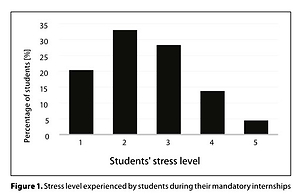Editor's Choice
RESEARCH PAPER
Number and type of medical errors caused by medical university students during their mandatory internships – survey research
1
Faculty of Medicine, Medical University, Wrocław, Poland
2
Department of Population Health, Division of Environmental Health and Occupational Medicine, Medical University, Wrocław, Poland
Corresponding author
Aleksandra Jaremków
Zakład Zdrowia Środowiskowego i Medycyny Pracy, Katedra Zdrowia Populacyjnego, Uniwerystet Medyczny we Wrocławiu, ul. J. Mikulicza-Radeckiego 7, 50-345, Wrocław, Polska
Zakład Zdrowia Środowiskowego i Medycyny Pracy, Katedra Zdrowia Populacyjnego, Uniwerystet Medyczny we Wrocławiu, ul. J. Mikulicza-Radeckiego 7, 50-345, Wrocław, Polska
Med Srod. 2022;25(1-2):2-7
KEYWORDS
TOPICS
ABSTRACT
Introduction and objective:
In Poland, during their education at medical universities students are obligated to do internships in a hospital facility. Unfortunately, situations sometime occur when, during the contact with their patients, students commit an error. This may be caused by lack of appropriate knowledge, or due to following wrong patterns. The aim of the study was to present the number and types of medical errors most commonly committed by students.
Material and methods:
506 medical students participated in the study. An anonymous on-line survey was conducted and distributed among students of medical universities in Wrocław, Zabrze, Opole, Łódź, Warsaw, Szczecin, Katowice.
Results:
70.9% participants were women. Most of participants were during the 2nd and 3rd years of study (43.1% and 24.9%, respectively). At least half of responders admitted committing at least one error. Most of them were related to hygienic procedures. Errors concerning drug administration or infectious material exposition were less often reported. Many students did nor report the error to their supervisors because of neglecting it or lack of knowledge, or a fear of criticism from the supervisor.
Conclusions:
The error committed by the majority of students related to sanitary procedures; therefore, appropriate measures should be imposed, such as an increase in the education of hygiene. A significant number of students reported that they felt unprepared for their tasks, which is the reason why there should be more emphasis on practical exercises during studies.
In Poland, during their education at medical universities students are obligated to do internships in a hospital facility. Unfortunately, situations sometime occur when, during the contact with their patients, students commit an error. This may be caused by lack of appropriate knowledge, or due to following wrong patterns. The aim of the study was to present the number and types of medical errors most commonly committed by students.
Material and methods:
506 medical students participated in the study. An anonymous on-line survey was conducted and distributed among students of medical universities in Wrocław, Zabrze, Opole, Łódź, Warsaw, Szczecin, Katowice.
Results:
70.9% participants were women. Most of participants were during the 2nd and 3rd years of study (43.1% and 24.9%, respectively). At least half of responders admitted committing at least one error. Most of them were related to hygienic procedures. Errors concerning drug administration or infectious material exposition were less often reported. Many students did nor report the error to their supervisors because of neglecting it or lack of knowledge, or a fear of criticism from the supervisor.
Conclusions:
The error committed by the majority of students related to sanitary procedures; therefore, appropriate measures should be imposed, such as an increase in the education of hygiene. A significant number of students reported that they felt unprepared for their tasks, which is the reason why there should be more emphasis on practical exercises during studies.
REFERENCES (25)
1.
Mikos M, Juszczyk G, Czerw AI. Odpowiedzialność cywilna ratownika medycznego za błąd medyczny. J Educ Health Sport. 2016; 6(11): 221–224. http://dx.doi.org/10.5281/zeno....
2.
Liszewska A. Odpowiedzialność karna za błąd w sztuce lekarskiej. wyd. 1. Kraków: Zakamycze; 1998.
3.
Husarz R, Jurek A, Jaroszyński J, et al. Definition of medical error and physicians’ interest in changes in the law. J Educ Health Sport. 2018; 8(7): 148–158. http://dx.doi.org/10.5281/zeno....
4.
Błachnio A. Dokumentacja medyczna w postępowaniu karnym. Zes Prawn UKSW. 2016; 16(2): 121–139. https://doi.org/10.21697/zp.20....
5.
Wrześniewska-Wal I. Malpractice-related deaths resulting from failure of due diligence. Decisions of Polish medical disciplinary boards. Arch Med Sadowej Kryminol. 2021; 71(1): 31–37. https://doi.org/10.5114/amsik.....
6.
Bari A, Khan RA, Rathore AW. Medical errors; causes, consequences, emotional response and resulting behavioral change. Pak J Med. 2016; 32(3): 523–528. http://pjms.com.pk/index.php/p....
7.
Kister A. Cost of quality loss as a result of medical errors (on the example of Polish healthcare institutions). Proceedings of the International Conference Current Challenges in Organizational Change and Interventions; 2014, Lyon, France. ISEOR: University of Jean Moulin; 2014.
8.
Puch EA, Nowak-Jaroszyk M, Swora-Cwynar E. Błąd medyczny w teorii i praktyce – przegląd najważniejszych zagadnień. Med Pr. 2020; 71(5): 613–630. https://doi.org/10.13075/mp.58....
9.
Ostrowski TM. Pozytywne i negatywne następstwa zdrowotne pracy lekarza na więcej niż jednym etacie. Pol Forum Psychol. 2009; 14(1): 78–89.
10.
Martinez W, Lo B. Medical students’ experiences with medical errors: an analysis of medical student essays. Med Educ. 2008; 42(7): 733–41. https://doi.org/10.1111/j.1365....
11.
Martinez W, Lo B. Medical students› experiences with medical errors: an analysis of medical student essays. Med Educ. 2008; 42(7): 733–41. https://doi.org/10.1111/j.1365....
12.
West CP, Huschka MM, Novotny PJ, et al. Association of perceived medical errors with resident distress and empathy: a prospective longitudinal study. J Am Med Assoc. 2006; 296(9): 1071–8. doi: 10.1001/jama.296.9.1071.
13.
Ebrahimi S, Tabei SZ, Kalantari F, et al. Medical Interns’ Perceptions about Disclosing Medical Errors. Educ Res Int. 2021; 1102135: 1–10.
14.
Klimkiewicz K. Rola praktyk studenckich w doskonaleniu praktycznego aspektu kształcenia studentów uczelni wyższych. Studia Ekonomiczne. Zeszyty Naukowe Uniwersytetu Ekonomicznego w Katowicach. 2015; 225: 93–101.
15.
Różańska A, Wójkowska-Mach J, Bulanda M. Praktyka zawodowa i staż pracy w ochronie zdrowia a wiedza studentów kierunków medycznych o wybranych procedurach higieny rąk. Med Pr. 2016; 67(5): 623–633. https://doi.org/10.13075/mp.58....
16.
Kawalec A, Kawalec A, Pawlas K. Przestrzeganie procedur higienicznych przez studentów wydziału lekarskiego. Med Pr. 2014; 65(5): 593–599. https://doi.org/10.13075/mp.58....
17.
Laberge M, MacEachen E, Calvet B. Why are occupational health and safety training approaches not effective? Understanding young worker learning processes using an ergonomic lens. Saf Sci. 2014; 68: 250–257. https://doi.org/10.1016/j.ssci....
18.
Kasperczyk J, Szczurek W, Szczurek D, et al. Wiedza, praktyka i postawy studentów kierunku lekarskiego i lekarsko-dentystycznego wobec higieny rąk. Probl Hig Epidemiol. 2016;97(3):229–235.
19.
Heinen I, Bullinger M, Kocalevent RD. Perceived stress in first year medical students – associations with personal resources and emotional distress. BMC Med Educ. 2017; 20(1): 4. doi: 10.1186/s12909-016-0841-8.
20.
Salam A, Segal DM, Abu-Helalah MA, et al. The impact of work-related stress on medication errors in Eastern Region Saudi Arabia. Int J Qual Health Care. 2019; 31(1): 30–35. doi: 10.1093/intqhc/mzy097.
21.
Kaldjian LC, Jones EW, Wu BJ, et al. Disclosing medical errors to patients: attitudes and practices of physicians and trainees. J Gen Intern Med. 2007; 22(7): 988–996. https://doi.org/10.1007%2Fs116....
22.
Gallagher TH, White AA. Medical error and disclosure. In: Bernat JL, Beresford HR, editors. Ethical and Legal Issues in Neurology. Handbook of Clinical Neurology, Amsterdam; 2013. p. 107–117.
23.
Lepisto BL, Taylor DK, Bachuwa G. Peer Role-Playing as Training for Medical Error Disclosure. J Grad Med Educ. 2017; 9(4): 541. https://doi.org/10.4300/JGME-D....
24.
Cooper K, Hatfield E, Yeomans J. Animated stories of medical error as a means of teaching undergraduates patient safety: an evaluation study. Perspect Med Educ. 2019; 8(2): 118–122. https://doi.org/10.1007/s40037....
25.
Trzcińska A. Ekspozycja zawodowa – problem wciąż aktualny. Forum Nefrol. 2016; 9(1): 66–71.
Share
RELATED ARTICLE
We process personal data collected when visiting the website. The function of obtaining information about users and their behavior is carried out by voluntarily entered information in forms and saving cookies in end devices. Data, including cookies, are used to provide services, improve the user experience and to analyze the traffic in accordance with the Privacy policy. Data are also collected and processed by Google Analytics tool (more).
You can change cookies settings in your browser. Restricted use of cookies in the browser configuration may affect some functionalities of the website.
You can change cookies settings in your browser. Restricted use of cookies in the browser configuration may affect some functionalities of the website.



